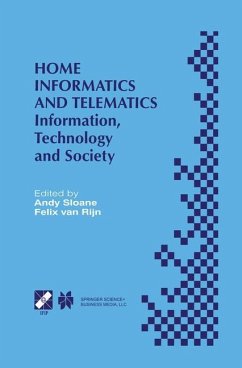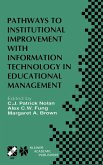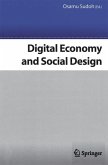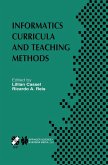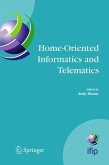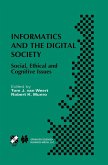The home is a key aspect of society and the widespread use of computers and other information appliances is transforming the way in which we live, work and communicate in the information age. The importance of this subject has never been greater with the encroachment of information technology into every corner of the home and social spheres. Many more homes in the developed world will have access to information and information technology in the near future, forming an information society. This book seeks to answer the questions surrounding this move to a `wired society', such as:
- How is the new technology actually used?
- What are the effects on society as a whole?
- How will it affect human relationships?
- Who will gain and who will lose?
- What technology is there to support everyday life?
- What services do people really want?
- How do we study aspects of this phenomenon? £/LIST£ Home Informatics and Telematics brings together papers from researchers around the world who are looking at this challenging problem domain. There are contributions on the technical computing areas associated with the home, the HCI of household technology, and theoretical studies on the sociological, psychological and methodological aspects of information technology in everyday life. Also included are studies on the use of computers and the Internet at home, along with fundamental research on the social nature of human communication. This volume contains selected proceedings from the International Conference on Home Informatics and Telematics (HOIT 2000), `IT at Home: Virtual Influences on Everyday Life', which was sponsored by the International Federation for Information Processing (IFIP) and held in Wolverhampton, United Kingdom, June 28-30, 2000.
This volume is composed of the best papers submitted to the HOIT2000 conference held in Wolverhampton, U. K. in June 2000. The conference, entitled "IT at home: Virtual influences on everyday life", and the papers reflect the wide variety of these influences that are coming to bear on our everyday experience, be it through the increasing use of computers or the rapid development of new telecommunications systems. The conference has been organised by IFIP Working Group 9. 3 - Home-Oriented Informatics and Telematics (HOIJ) , in association with IFIP Working Group 13. 2- Methodology for user-centred system design. This gives a broad range of topics that are within the sphere of interest of the participants and the authors of the papers. The disciplines involved in the study of this subject area are varied composing computing, telecommunications, psychology, sociology, business studies and others. The conference is the second in a series of HOlT conferences, the first being held in Copenhagen in 1994. The subject is now more mature with the various disciplines being increasingly interested in the home as a research domain. The various technical developments over the time since the first conference have also had a profound effect on the way in which people communicate both in the home and at work. The rise in the use of the Internet has changed the way in which many people view communication and access to information sources.
- How is the new technology actually used?
- What are the effects on society as a whole?
- How will it affect human relationships?
- Who will gain and who will lose?
- What technology is there to support everyday life?
- What services do people really want?
- How do we study aspects of this phenomenon? £/LIST£ Home Informatics and Telematics brings together papers from researchers around the world who are looking at this challenging problem domain. There are contributions on the technical computing areas associated with the home, the HCI of household technology, and theoretical studies on the sociological, psychological and methodological aspects of information technology in everyday life. Also included are studies on the use of computers and the Internet at home, along with fundamental research on the social nature of human communication. This volume contains selected proceedings from the International Conference on Home Informatics and Telematics (HOIT 2000), `IT at Home: Virtual Influences on Everyday Life', which was sponsored by the International Federation for Information Processing (IFIP) and held in Wolverhampton, United Kingdom, June 28-30, 2000.
This volume is composed of the best papers submitted to the HOIT2000 conference held in Wolverhampton, U. K. in June 2000. The conference, entitled "IT at home: Virtual influences on everyday life", and the papers reflect the wide variety of these influences that are coming to bear on our everyday experience, be it through the increasing use of computers or the rapid development of new telecommunications systems. The conference has been organised by IFIP Working Group 9. 3 - Home-Oriented Informatics and Telematics (HOIJ) , in association with IFIP Working Group 13. 2- Methodology for user-centred system design. This gives a broad range of topics that are within the sphere of interest of the participants and the authors of the papers. The disciplines involved in the study of this subject area are varied composing computing, telecommunications, psychology, sociology, business studies and others. The conference is the second in a series of HOlT conferences, the first being held in Copenhagen in 1994. The subject is now more mature with the various disciplines being increasingly interested in the home as a research domain. The various technical developments over the time since the first conference have also had a profound effect on the way in which people communicate both in the home and at work. The rise in the use of the Internet has changed the way in which many people view communication and access to information sources.

